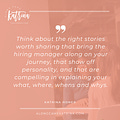Candid career advice #4: Master storytelling; land any job
The person who knows your story best is you.
If you like having cryptic job advice debunked and receiving career tips that actually work, I encourage you to subscribe to my newsletter.
This post has been updated to remove the original audio recording (the platform that houses the audio is no longer in server). The audio has been transcribed below.
TL;DR - Below I talk about
✅ Why the interview process is broken.
✅ How using storytelling benefits both the interview and the interviewee.
✅ The key thing to keep in mind when storytelling.
✅ And how else you can apply storytelling to your daily life.
Today, I want to tell you why mastering storytelling is essential to landing any job.
Before I get to that, I want to state that the whole hiring process is broken. But for today’s post, I’m to highlight why the interview process needs to be approved and how storytelling can address that,
There are so many companies that have yet to implement effective interview strategies, such as asking open-ended questions, having processes in place that reduce bias, training on how to conduct interviews properly, or a vetting system where candidates can provide feedback about their interview experience.
When these processes are not in place or worst, not followed/encouraged, often times the interviewing experience ends up feeling more like a game or even a really awkward blind date. You know, where you feel you need to say the right things, to impress the other person. Or if you’re only sharing your best accomplishments to prove you’re capable.
I get it - you’re trying to find a job. And when you have rent, a mortgage, or family to take care of, there’s a lot of pressure to feel you have to say the right things to hopefully land your next gig.
Unfortunately, this way of thinking and behaving and this characterization of the interview process serves no one. This places unnecessary stress on the interviewee and sets interviewers up for failure, because they may miss out on their next best hire.
If you happen to be looking for a job, instead of worrying about if you’re saying the right things, I challenge you to think about the right stories worth sharing that bring the hiring manager along on your journey, that show off personality, and that are compelling in explaining your what, where, whens and whys.
So, here’s why storytelling can help you land any job:
When interviewing, storytelling humanizes the interview experience. Yes, the reality is you have to answer questions. But using stories can bring you and the interviewer into a space that is more conversational and less one-sided.
Storytelling allows the interviewer to get a better idea of who you are as a person. The truth is hiring managers are looking to hire real people, with real personalities. It’s one thing to show off your best accomplishments. However, what are you like on a regular day? What can a hiring manager expect from when you’re not feeling your best? That’s interesting, and something they would want to learn more about. So show off your personality—be expressive with your emotions. Be an open book.
Storytelling can help alleviate interviewing stress since you’re recounting your experiences that are probably relatable. You know your own story better than anyone so this should make answering interview questions a lot easier.
Now many of you will say, storytelling is easier said than done.
The key to effective storytelling is keeping in mind a start, middle, and end. Often times we have a tendency to ramble when we are nervous or when we get caught up in trying to explain something, which is why the STAR method, (Situation, Task, Action, and Result) is so effective.
The reality is whenever you look forward to watching a new show or reading a new book, you expect those same three (3) things so you should also make it a habit of ensuring you cover those same three (3) things in whatever it is you’re trying to communicate.
And storytelling isn’t reserved just for the interview either.
When you write your resume, cover letter, portfolio, or your “About Me,” those should all tell a story of where you’ve been, where you are, and where you’d like to go.
Everyone has a story to tell. It’s about getting others to listen and understand it.
Ciao for now,
Katrina




